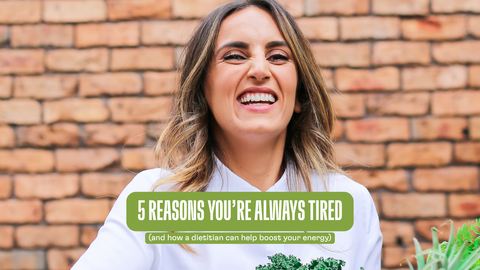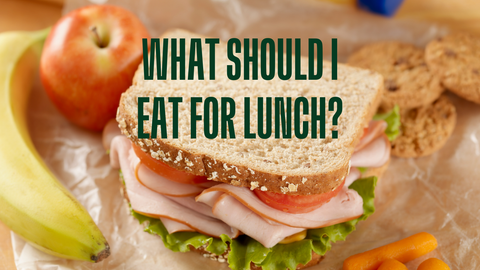Feeling tired and sluggish? Low energy can affect every part of your life — from your productivity at work to how much you enjoy time with family and friends.
While many factors contribute to fatigue, your nutrition and lifestyle choices play a huge role in how energised you feel each day.
In this month’s blog, our resident dietitian Nicole Saliba from Eatsense by ORS shares practical, evidence-based tips to help you feel more vibrant and alert.
If you’re experiencing constant tiredness, here are five common reasons your energy levels might be low — and what you can do to fix them.
Prioritise Quality Sleep for Better Energy
Many of us struggle with getting good quality sleep, and this can significantly impact energy levels during the day.
Don’t eat 2 hrs before bedtime. Consuming food within two hours of going to sleep can lead to discomfort, indigestion, or acid reflux, all of which interfere with restful sleep.
- Include foods to support sleep at dinner rich in tryptophan and melatonin. Tryptophan is an amino acid that helps the body produce melatonin and serotonin, hormones that promote relaxation and sleep. Foods rich in tryptophan include turkey, chicken, eggs, nuts, seeds, and dairy products. Naturally occurring melatonin can be found in small amounts in foods such as cherries, tart cherry juice, grapes, tomatoes, and oats.
- Reduce alcohol consumption. While it may initially make you feel sleepy, alcohol actually disrupts the sleep cycle and reduces overall sleep quality, often causing fragmented sleep and early waking.
- Limit caffeine. Caffeine is a stimulant that can delay the onset of sleep and reduce total sleep time. It’s important to avoid caffeine-containing drinks like coffee, tea, and energy drinks for at least four to six hours before bedtime.
Choose the Right Carbohydrate for Sustained Energy
Carbohydrates are your body’s main and preferred fuel source. When you don’t eat enough carbs, or if you choose the wrong types, it can leave you feeling tired, foggy, and low on energy.
Smart Carb Choices:
-
Avoid high-sugar snacks like chocolate, lollies, and soft drinks, which cause blood sugar spikes and crashes.
-
Opt for low-GI carbohydrates such as brown rice, quinoa, sweet potato, legumes, fruit, and non-starchy vegetables for long-lasting energy.
-
Balance your plate. Aim to fill one-quarter of your plate with slow-releasing carbs such as wholegrain bread, brown or Basmati rice, or high-fibre pasta.
Check Your Iron Levels
If your iron levels are low, this can lead to symptoms like tiredness, a low immune system, weakness, and difficulty concentrating.
- Include a variety of iron-rich foods daily. Such as lean red meat, chicken, fish, eggs, beans, lentils, tofu, spinach, nuts and fortified breakfast cereals.
- Include an Activate Foods meal rich in iron:
- Mexican Burrito Bowl
- Vegan Moroccan Tagine
- Beef Lasagna - Boost iron absorption by combining foods wisely. Pair plant-based iron sources with vitamin C-rich foods like citrus fruits, berries, kiwi fruit, tomatoes, or capsicum to help your body absorb more iron.
- Consider supplements if necessary. If you’re diagnosed with iron deficiency, your GP or dietitian may recommend iron supplements. It’s important that any supplementation is guided by a healthcare professional to avoid side effects or excess intake.
Eat Regular Meals to Maintain Stable Energy
Skipping meals or eating irregularly can cause your blood sugar to fluctuate — leading to mood swings, poor concentration, and afternoon slumps.
Aim to eat balanced meals and snacks at consistent times throughout the day to maintain a steady supply of energy.
Stay Hydrated for Optimal Energy and Focus
Coming into the warmer months it’s important to stay hydrated. Dehydration is a commonly overlooked cause of low energy and fatigue. Even mild dehydration can reduce concentration, mood, and physical performance, making you feel sluggish and tired.
- Aim to drink enough fluids throughout the day. Include water as your primary beverage. The amount varies depending on your age, activity level, and environment, but a general guide is around 2 to 2.5 litres daily for most adults.
- Include hydrating foods in your diet. Such as cucumbers, watermelon, oranges, and leafy greens, which contribute to your overall fluid intake.
- Limit sugary drinks and excessive caffeine. These can contribute to dehydration or cause energy spikes and crashes.
- Set reminders or use water bottles to establish regular hydration habits. This is important especially if you tend to forget to drink during busy or active days.
How a Dietitian Can Help You Boost Energy Naturally
Dietitians don’t just give you advice - they help you make small, achievable changes that fit your lifestyle. By understanding your preferences, routines, and goals, a dietitian can help you:
- Identify nutrient deficiencies that may cause fatigue
- Plan balanced meals that stabilise your energy
- Create long-term, sustainable eating habits
If you’re feeling constantly tired or run down, book a consultation with a dietitian. You’ll get expert guidance, accountability, and a plan tailored to your lifestyle - helping you feel more energised, focused, and confident every day.
Nicole Saliba
Senior Dietitian - Eatsense by ORS

